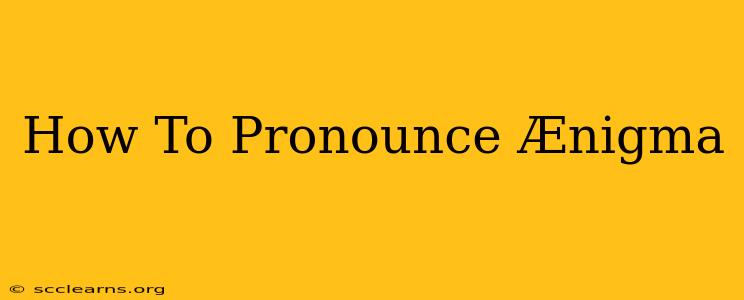The word "Ænigma" presents a unique challenge for many speakers due to its unusual spelling and the presence of the "Æ" ligature. This guide will break down how to correctly pronounce this intriguing word, exploring its etymology and providing helpful tips to avoid common mispronunciations.
Understanding the Etymology of "Ænigma"
Before tackling the pronunciation, let's delve into the word's origins. "Ænigma" is a variant spelling of "enigma," a word derived from the Greek word "αἴνιγμα" (aínigma), meaning "riddle" or "puzzle." The "Æ" is a ligature, a combination of two letters, in this case "A" and "E". While this ligature is less common in modern English, it historically represented a specific vowel sound. Understanding this historical context is crucial for accurate pronunciation.
The Correct Pronunciation of "Ænigma"
The pronunciation of "Ænigma" is essentially the same as "enigma". There's no significant difference in sound due to the archaic spelling using the Æ ligature. The correct pronunciation, in common usage, is:
eh-NIG-muh
- eh: As in the word "egg," a short "e" sound.
- NIG: As in "night," the "n" is soft and the "ig" is pronounced as a single unit.
- muh: As in "mud," a short "u" sound.
Breaking Down the Syllables:
The word has three syllables: eh-NIG-muh. Emphasize the second syllable, "NIG," to give the word its proper cadence.
Common Mispronunciations and How to Avoid Them
One common mistake is mispronouncing the first syllable as "ay" as in "say". Another potential misstep involves adding an extra emphasis on the last syllable "muh."
Remember: The focus remains on the middle syllable and keeping the first syllable as the short "e" sound. Practice saying the word slowly, focusing on each syllable individually before putting it all together.
Tips for Perfecting Your Pronunciation
- Listen to audio recordings: Search online for audio pronunciations of "enigma" (the more common spelling). The pronunciation remains consistent regardless of the "Æ" variation.
- Practice regularly: The more you say the word aloud, the more comfortable you'll become with its pronunciation.
- Record yourself: Listen to yourself pronounce the word to identify any areas needing improvement.
- Use it in sentences: Incorporate "Ænigma" into sentences to practice its pronunciation in context. This helps familiarize you with its natural flow in conversation.
Conclusion: Embrace the Enigmatic Sound
While the spelling of "Ænigma" may appear unusual, mastering its pronunciation is achievable with consistent practice and attention to the sounds of its syllables. By following the steps outlined in this guide, you'll confidently articulate this intriguing word, adding another layer to your vocabulary and enhancing your communication skills. Now go forth and pronounce "Ænigma" with confidence!

